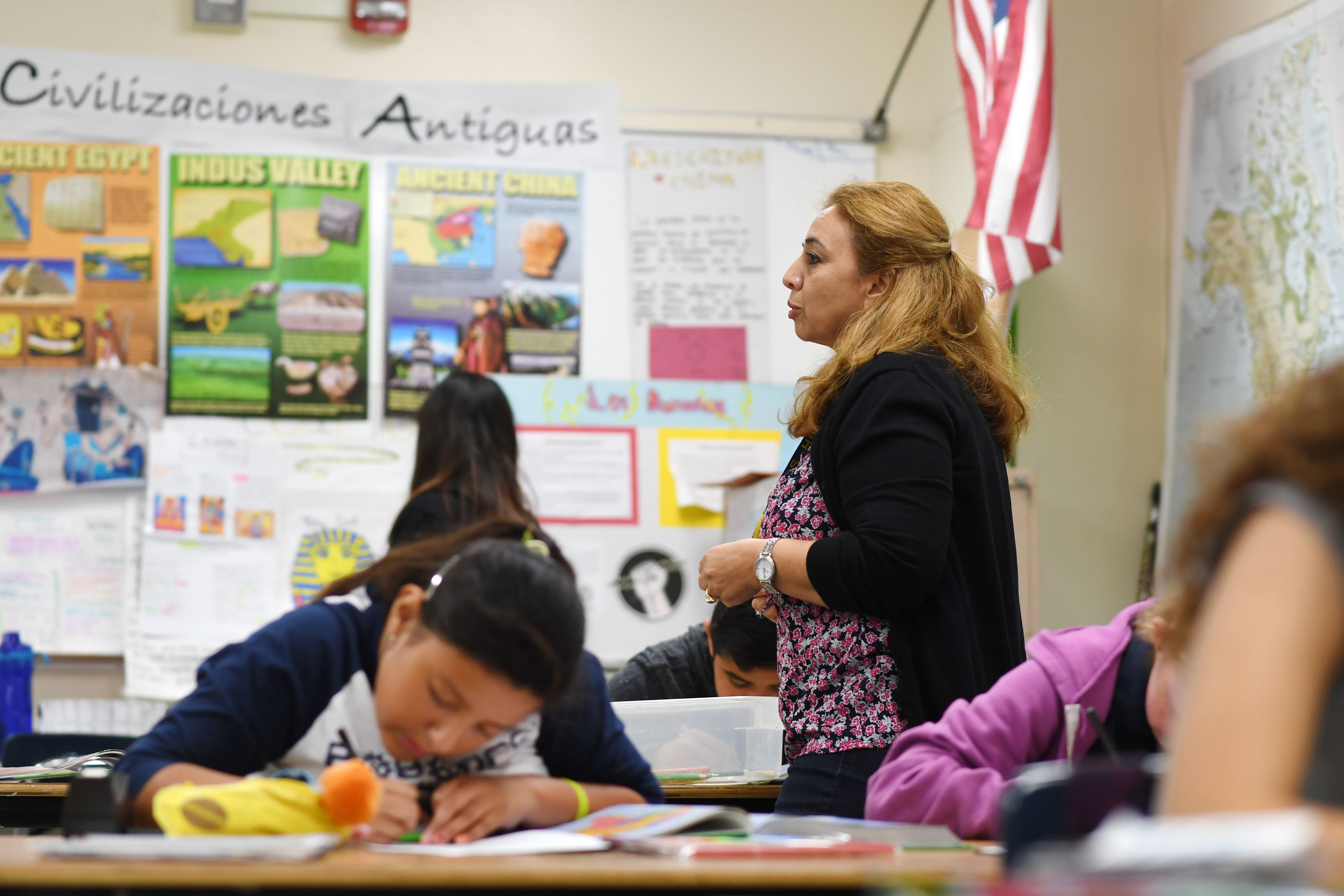Commentary
Three of my grandparents were immigrants from Europe and spoke German dialects. The two grandmothers came as young children and quickly learned English, which is typical. A young kid picks up a new language like a sponge.
My paternal grandfather, whose name I bear, came over in 1905 when he was 14 and first started working in the coal mines of Pennsylvania. He then moved to Detroit and worked on one of Henry Ford’s assembly lines.
Along the way, he studied English every chance he could in night school. I still have his well-thumbed English-to-German and German-to-English pocket dictionaries. He always spoke with an accent much like Arnold Schwarzenegger’s. But he was well-read and always began the day with a Detroit newspaper.
I bring this up because Gov. Gavin Newsom signed a new law on Oct. 7 supposedly to help what now are called “newcomer students” in educrat jargon. It’s Assembly Bill 714 by Assemblyman Kevin McCarty (D-Sacramento). Basically, as a Sacramento Democrat, he represents the state government to itself.
It’s good to sample a little of the educationese put into these bills, showing the bill authors themselves need a course in writing plain English. Among other things, the bill will “require the State Department of Education to (A) curate and maintain on its internet website information regarding requirements, best practices, and available state and federally funded programs for newcomer pupils and (B) publicly report on an annual basis on its internet website the enrollment of newcomer pupils.”
And it will require the Instructional Quality Commission “to consider including content designed to provide teachers with resources to meet the unique academic and English language development needs of newcomer pupils.”

The California State Capitol building in Sacramento on April 18, 2022. (John Fredricks/The Epoch Times)
And it will “require that local educational agencies comply with the above-described coursework exemptions, pupil consultation and notice requirements, acceptance of coursework completed at other schools, and other requirements for newcomer pupils, as defined, instead of for pupils participating in a newcomer program. By imposing new duties on local educational agencies, the bill would impose a state-mandated local program.”
In sum, it will impose new bureaucratic requirements and costs on the state, as well as on local school districts. Although the districts will be “reimbursed” for the added expense.
Learning a New Language Is Nothing New
Ever since the first two groups of people speaking different languages met and, after not killing one another, decided to trade and intermingle, they had to learn one another’s languages. In America, after the Revolution of 1776 and the Constitution of 1787, gradually English pushed aside the other languages in the country. Such as the German of the Pennsylvania Dutch (really Germans); the Dutch of the settlers in the Hudson Valley, such as the Roosevelts; the French in Vermont and Louisiana; and the Spanish of Florida and the Southwest.
The many millions of immigrants who came here as adults learned English much as did my grandfather: by direct immersion in the English language and culture and intense study of their new tongue.
That’s also how I learned Russian at the Defense Language Institute at Monterey, Calif., in a 52-week course in 1978–79. As soon as we learned some basic words and phrases and the new alphabet, it was what linguists call “total immersion.” All our teachers were native Russian speakers, exiles from the communist Soviet Union. They insisted we speak in the language we were learning.
Russian is harder to learn for English-language speakers than Spanish, German, or Italian. But it’s easier than Chinese. Yet all of us learned it in that one year and left being quite fluent. We had to be, because our job was listening to Red Army troops planning to invade West Germany.
I also grew up in a Detroit suburb where many families were immigrants, mainly from Europe, but also from the Middle East, Iran, China, India, Mexico, and Japan. Detroit’s districts still are known by this: Greektown, Corktown (Irish, who already spoke English), Poletown, Germantown, Mexicantown, etc. Windsor, Canada, just across the Detroit River, had a Chinatown.

English teacher Radka Tomasek speaks to the class at the English Center in Miami, Fla., on June 16, 2006. (Joe Raedle/Getty Images)
More Bureaucracy
According to EdSource’s
article on AB 714, “Separating data on newcomers from other English learners is important, said Jeannie Myung, director of policy research at Policy Analysis for California Education, or PACE, an independent research center at Stanford University that focuses on education.”
Ms. Myung herself said, “We know that what we don’t measure, we don’t really understand, and what we don’t understand, we can’t really improve.”
What’s to “measure”? Put the “newcomer students” in a classroom. Hand them some dictionaries. Start talking.
Actually, today it’s even easier with plentiful lessons in all languages free on YouTube. Or such fairly cheap resources as Pimsleur, Babbel, Duolingo, Busuu, Rosetta Stone, and numerous others.
Google Translate also provides quick and quite accurate translations from almost any language to another. I use it whenever I come upon a foreign article and need to get the gist of what’s in it.
And the main streaming video services, such as YouTube, Netflix, Hulu, and Amazon Prime, offer subtitles in different languages. Thus, a Spanish-speaking person learning English can play a movie in Spanish, but see the English subtitles; or vice versa.
These times offer a cornucopia of ways to learn a language. If they had been available in 1978–79, I would have learned Russian twice as fast. Of course, Monterey is an incredibly beautiful California city, especially for someone from the frigid Michigan steppes. So spending 12 months there instead of six was a bonus.
Conclusion: Excessive Education Bureaucracy
Programs such as those advanced by AB 714 are a symptom of a greater problem: A pointlessly bureaucratic education system. It grants high salaries and easy jobs to the educrats who run it, but wastes the time of everyone involved.
If an immigrant like my grandfather can learn English with “total immersion,” anybody can. He was “just off the boat,” a phrase I heard a lot growing up, meaning he went through Ellis Island, then was shipped inland to a job and whatever fate his own hard work and moxie could bring him.
Although he never attended high school, in addition to learning English, while working in the Ford factory, he took carpentry courses and went into that trade. He took more courses and became a Master Carpenter and cabinetmaker. He eventually worked putting cabinets in the mansions of the Ford family in whose factories he had worked.
After he retired in the early 1950s, the Fords called him back to work for them again in the early 1960s before he retired for good and lived to 83. That’s how he came here and raised a family.
It’s a typical American immigrant story. Tens of millions of other immigrants have done the same thing. No education bureaucracy needed.
















